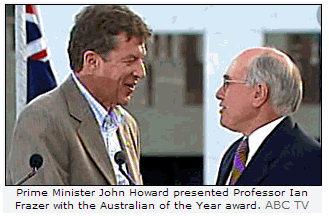 Awarding
of Australian of the Year Shows Off Prime Minister's Disingenuousness.
(January 26, 2006)
Awarding
of Australian of the Year Shows Off Prime Minister's Disingenuousness.
(January 26, 2006)|
|
|
|
|
|
|
News & Views item - January 2006 |
![]()
 Awarding
of Australian of the Year Shows Off Prime Minister's Disingenuousness.
(January 26, 2006)
Awarding
of Australian of the Year Shows Off Prime Minister's Disingenuousness.
(January 26, 2006)
Professor Frazer working together with Dr Jian Zhou explains his initial discovery which led to the development of an effective vaccine for cervical cancer, "We were working on how the virus that causes cervical cancer actually causes the cancer and I unexpectedly found a way of making something that looked just like the virus but wasn't infectious and that became the basis of the vaccine. That was 15 years ago and since then what has mostly been happening is clinical trials to see if the vaccine works."
The University of Queensland professor is director of the Centre for Cancer and Immunology Research and says he wants to take advantage of receiving the honour to lobby the Coalition government to increase support for medical research.
Considering the resounding lack of support for fundamental scientific research both within and outside our universities and the half-hearted incentive for the private sector to invest in research and development to say nothing of the stultifying approach toward the Australian Research Council, let's hope Professor Frazer has been given supernatural powers of persuasion.
The Prime Minister's all but hypocritical, "It is a reminder that excellence in Australia is to be found not just in sport, not just in business but also very much in medical science," as he announced the award should be viewed within the context that in late September 2004, shortly before the federal election, medical researcher and Nobel Laureate, Peter Doherty, along with the former head of the Walter and Eliza Hall Institute of Medical Research, Sir Gustav Nossal, and the recipient of the 2004 Prime Minister's Science Prize, bionic ear pioneer Graeme Clark, was among the signatories to a letter addressed to Mr Howard, and the then Leader of the Labor Opposition, Mark Latham asking why in amongst all the promised largess there is no mention of increased funding for medical research. The challenge was met with studied indifference.